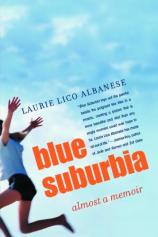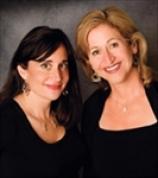Interview: March 2004
Q: Is Blue Suburbia a real town, a state of mind, or simply a clever phrase you created?
LA: Blue Suburbia is every blue collar or suburban town where the rules of conduct are narrow, the furniture matches, conformity is required, creativity and originality are frowned upon, children are expected to be seen and not heard, and women are encouraged to cook well-balanced dinners every evening and clean their bathrooms every morning. I grew up in a suburb outside of New York City, my father repaired IBM office machines, and my mother was fundamentally unhappy -- so the title has several meanings, and all of them are intentional.
Q: What do you mean by the subtitle, Almost a Memoir?
LA: As Emily Dickinson suggests, I tell the truth but I tell it slant. Some details are changed in the book -- for example, I grew up behind a firehouse and attended high school across from the county prison complex. By writing that I grew up "in the shadow of the jailhouse," I tell a near truth, factually speaking, while communicating metaphorically the physical and emotional circumstances of my childhood in that simple phrase.
Also, I changed all names to give family and friends a thin veil of privacy.
Q: Is this primarily a memoir or a poetry collection?
LA: Blue Suburbia is primary a memoir, although it's written in verse. The language is very plain and straightforward -- this isn't classical poetry, but modern free verse. Most people who've read the book and fallen in love with it aren't poetry fans, per se, but readers who enjoy a good story and a strong narrative voice. Because the book is written in first person, it's very intimate and immediate. And because the narrative is fast-paced and chronological -- from childhood through to the present time in my adult life -- I think it's easy for readers to quickly become absorbed in the progress of the story, and to forget that it's written in free verse.
Q: Blue Suburbia is a story of overcoming obstacles and transcending your family history. To what do you credit the spirit and resilience you show in the book?
LA: Most of my favorite stories involve people who are presented with seemingly insurmountable obstacles, who then persevere and triumph through sheer will and spirit.
Basically I'm a stubborn, scrappy person. I learned how to live that way from watching my dad, but resilience is also an inborn trait, and I got more than my share right from birth. My parents' attempts to control me made me defiant. My father's heavy hand with his belt made me defiant. It was this defiance, coupled with a pretty sharp mind, which spurred me on. I was lucky because an elementary school teacher realized I was smart, and encouraged me to apply myself in school. I clung to my intelligence and creativity, and in the end I believe they were my saving grace.
Q: The writings about your father are filled with anger and love. How do you reconcile these two seemingly opposite emotions?
LA: Readers learn in the book that my grandparents were far more brutal than either of my parents. My father didn't punch us, and my mother didn't hit us with her high-heeled shoes, so they believed they were using self-restraint.
My father was a man of his time and place. To hit your children with a belt when they aggravated you wasn't abusive but simply a part of parenting, in his mind. My father had emotional limitations he couldn't easily overcome, and yet he loved us and longed to do right by his children. Many times I had heart-to-heart talks with my father right after he hit me. Very quickly after the rage erupted, the release would come ... and intimacy would follow. It sounds messed up, but it's not an unusual pattern.
I never doubted my father's love for me. He would have died for me. It just never occurred to him to stop hitting me until I was already grown. As an adult I empathized with his limitations, and with the fact that he was an abused child himself.
Q: Your mother is a tragic figure. Is there anything to be learned from her suffering?
LA: My mother's unhappiness was probably chemically based, and it makes me feel both blessed to live in the age of psychopharmacology, and sad that my mother never found the release she needed.
Living under the cloud of her unhappiness, I learned that if something hurts you, smothers you, or keeps you from experiencing joy in the world ... get away from it. My mother didn't have the strength or the wherewithal to escape the life that fate prescribed for her, but I was determined not to make the same mistakes. She was trapped; I refused to be trapped.
Q: The poems "Just Shake and Bake" and "Hurry" suggest that even as a young girl you had a sense that there might be some other life for you.
LA: I did think there must be some other way to live, but I had no idea what that life might be like or how I might find it. Going away to college opened my eyes to the larger socioeconomic world. Until than, I thought people were either like "us," or they were "really rich."
It also took a long time for me to realize that being a mother and a housewife doesn't automatically make a woman unhappy. I never knew any happy adults. I had no idea how happy people lived, and had very little faith in the fact that there was such a thing as a happy family, no matter what Tolstoy said!
Q: Do you have a happy family now?
LA: Yes, and I'm very grateful for it. One of my biggest fears was that I'd never live in a happy home.
Q: Would you agree the book is a testament to the redemptive power of love?
LA: That's almost the only thing I'm interested in writing about -- how people surmount the obstacles life presents them, and how love is always a component of that triumph. So yes, this is a book about the redemptive power of love, just as my first novel, Lynelle by the Sea, is about loss and the redemptive power of love.
Q: Do you have a poem that sums up your childhood experience most aptly?
LA: "Five Best Ways to Maim A Man" is one of my favorite poems in the book because it shows how violence and love were all mixed up together in my family. We were taught that the world is dangerous and people aren't to be trusted. The irony, of course, is that the violence perpetrated on me came from the same place the love was coming from -- my father. And while my father was teaching me how to protect myself from some shadowy strangers, the man right next door was molesting me in his bathroom.
This is one of the poems I read to my father before he passed away, and he liked it very much. He understood it as a poem that shows him as my protector, and in the simplest way, it is. But it's much more, as I hope many of the poems in the book communicate the dual nature of love, and the struggles inherent in our passage to adulthood.
Q: What do you hope readers will take from Blue Suburbia?
LA: I've written as honestly as possible about the various things I was up against as a child, as a young adult, as a new mother, and as an anxious person. I've tried to show how I didn't let any of those obstacles or circumstances beat me down.
The poems "Ordinary" and "The Sirens" sum up what I hope readers will take from the book and use when thinking about their own lives. My life story is unique in its particular details, but the theme is universal. Most of us can point to a certain path and say, "that was my fate," and then we can point to present circumstances and say, "here's how I took control of my own life."
Now I have a happy, relatively ordinary life ... and that's no small thing to me. I'm grateful for it.
Excerpted from Blue Suburbia © Copyright 2012 by Laurie Albanese. Reprinted with permission by Perennial. All rights reserved.



